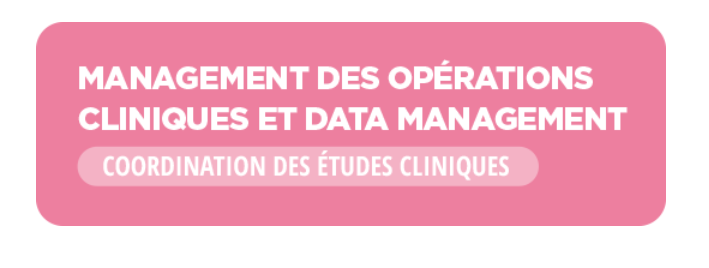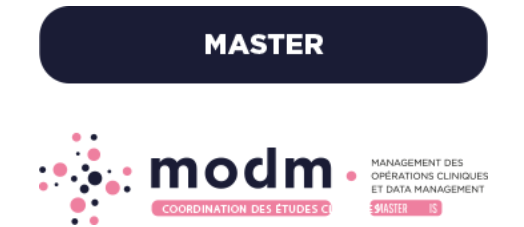MODM coordination of clinical studies


THE COURSE PROVIDES DUAL SKILLS IN CLINICAL RESEARCH AND PROJECT MANAGEMENT. IT TRAINS MANAGERS SPECIALIZED IN CLINICAL RESEARCH: CLINICAL RESEARCH ASSOCIATE, INTERNATIONAL CLINICAL STUDY COORDINATOR, ETC.
OBJECTIVES
The aim is to train managers specialized in the job of Clinical Research Associate (CRA) in Master 1. In Master 2, the course is rounded off with Project Management to qualify for the position of International Clinical Studies Coordinator. Work-study placements are available with major pharmaceutical companies.
highlights of the clinical studies coordination pathway
- Project-based learning
- Professional integration
- Work-study
- In-class professional lecturers (40% in M1, 70% in M2)
- Student follow-up
SPECIFIC KNOWLEDGE PROVIDED BY THE COURSE
Master 1
- Therapeutic approaches
- Monitoring and logistics of clinical trials:
-Regulatory environment, pre-clinical file, clinical file - Essential ICH documents for conducting tests (before, during and at the end of the test).
- Introduction to clinical database management, CDISC standards.
- Medical writing according to ICH
Master 2
- Project management, planning and coordination for international clinical trials
- Feasibility study, human and financial resource requirements
- Clinical data management, data management, Risk Based Monitoring and RGPD
- Statistical methods applied to clinical trials
- Pharmacovigilance, adverse event management
- Subcontracting management
SPECIFIC SKILLS PROVIDED BY THE COURSE
- Project management: planning, managing costs, deadlines and risks
- Design, coordinate, monitor and implement clinical studies
- Conducting a feasibility study
- International regulations (ICH, FDA, CTD, etc.).
- Knowing standard procedures
- Ensure data compliance, quality and management
- Understanding the statistical methodology of clinical trials
- Managing adverse events, pharmacovigilance
- How to write an ICH clinical study report
- Managing subcontracting in the developer-CRO relationship
- Respecting ethics in clinical trials
TEACHING RESOURCES AND PROFESSIONAL EXPERIENCE
- Educational space for 3D printing in healthcare. Learning Lab, flipped courses, interactive seminars, company visits, project-based learning...
- Numerous professional guest speakers
- M1 + M2 open to apprenticeships, schedules adapted to optimize practical training
CAREER OPPORTUNITIES
ARC, ARC MANAGER I CLINICAL STUDIES COORDINATOR I CLINICAL STUDIES MANAGER I CLINICAL PROJECTS MANAGER
Download the course
Video: interview with a student from both 6th year pharmacy and M2 Clinical Operations Management student as part of INSIDE IS ISMA
all m1+m2 core courses (download)
all specific m2 units (download)
Specific MASTER 1 courses :
SEMESTER1 :
TU PAM1AXET: THERAPEUTIC APPROACHES - PHARMACOKINETICS - PEC
Number of ECTS = 5 - Responsible for TU : Patrice Ravel
Prerequisites: Physiology program (Bachelor's degree), knowledge of clinical trial procedures
Modalities: 43.5h CM + 6h TD
Objectives
-
- Provide students intending to work in clinical research with a basic knowledge of the various therapeutic areas covered by clinical studies.
- Understanding the pharmacokinetic file
- Oral and written presentation skills
TU CONTENTS
THERAPEUTIC APPROACHES
Oncology, Cardiovascular, CNS, Pneumology, Thrombosis, Diabetes, Hypertension, Hematology, Rheumatology, Psychiatry, Analgesics, Malaria, Infectiology, Vaccine trials, Medical device trials
PHARMACOKINETICS
Definition of the main variables involved in Phase 1 clinical development
PEC
Oral presentations by English and French students
CV and cover letter proofreading
Teaching methods :
Lectures and tutorials
Assessment methods: Written test
Speakers
Montpellier University and external professionals
SEMESTER 2
TU PAM1MON: CLINICAL TRIAL MONITORING AND LOGISTICS
Number of ECTS = 5 - Responsible for TU : Patrice RAVEL
Essential prerequisites: This TU cannot be dissociated from the other TU specific to the course.
Modalities : 41 h CM + 6 h TD This TU includes reference hours (APP + hospital internship)
Objectives
- Provide students intending to become Clinical Research Associates with the basic knowledge needed to set up and monitor clinical trials in line with good clinical practice.
- Define the different phases of clinical trials.
- Present the job of Clinical Research Associate (CRA) and all its missions.
Contents
Phase I, II, III clinical trials
Clinical trial monitoring and logistics
- Trial set-up, protocol, observation notebook, e-CRF,
- Follow-up of monitoring visits from the 1st visit to the closing visit.
- Investigators: recruitment, training, brochures
- Essential documents for conducting tests (before, during and at the end of the test)
- Documents for submission to HAS (ANSM, CPP, CNIL, etc.)
- Clinical batch distribution
The players and professions involved in clinical research
- The Arc laboratory/ Arc hospital profession
- Structures involved in clinical research (CIC, URC, CRC, CRB, etc.),
Bioequivalence tests
- Medical device testing
Hospital internship (4 weeks)
Speakers: External professionals
TU PAM1AFRE: REGULATORY AFFAIRS, BPC, PHARMACOVIGILANCE
Number of ECTS = 5 - Responsible for TU : Patrice RAVEL
Essential prerequisites: This TU cannot be dissociated from the other TU specific to the course.
Modalities : 32 h CM + 6h CM +3h TD
Objectives
- To provide students intending to work in Clinical Research and Development with basic knowledge of the regulatory environment.
- Mastering Good Clinical Practice - standardization ICH, CTD, FDA, EMEA, ANSM, CPP ...
- Acquire the basics of pharmacovigilance and adverse reactions.
- Give the basics of clinical trial planning.
Contents
- Regulatory environment for clinical trials
- Good clinical practice - standardization ICH, CTD, FDA, EMEA, ANSM, CPP, ...
- Quality assurance and quality control in clinical research and auditing
- Pharmacovigilance, serious and non-serious adverse reactions
- Operational planning
Teaching methods :
- Lectures, tutorials and projects supervised by professionals.
Assessment methods :Written test - Case study
Speakers
University of Montpellier and external professionals
TU PAM1DATA: INTRODUCTION TO CLINICAL DATABASE MANAGEMENT - DATA MANAGEMENT
Number of ECTS=5 - Responsible TU : Patrice RAVEL
Prerequisite:
This TU cannot be dissociated from the other TU specific to the course.
Statistics prerequisite: L3 Health Engineering level.
Objectives
- Introduction to clinical database management (Data Management)
- Know how to create a database from a CRF, and understand the main data quality controls.
- Learn about Data Management and the main tasks of a Data Manager.
- Know the different tools for entering source data.
- Master the basics of statistical analysis applied to clinical trials.
Contents
Data Management
- Definition and missions of a Data Manager
- Database structure, data quality control, freeze base
Introduction to SAS language
- Create tables, import data files, use simple procedures for statistical analysis of clinical data.
Statistical methodology applied to clinical research
- Statistics reminder
- Experimental designs: parallel designs, matched series designs, cross-over designs, bioequivalence tests
Epidemiological studies
Medical writing
Teaching methods :
- CM, TD, TP, and implementation of lessons through a tutored project on ACCESS
- 5 sessions of 3 hours of practical work on SAS software per student
Assessment methods :
- Written test - SAS practical test and continuous assessment
- Tutored project and written report
Speakers
University of Montpellier and external professionals


